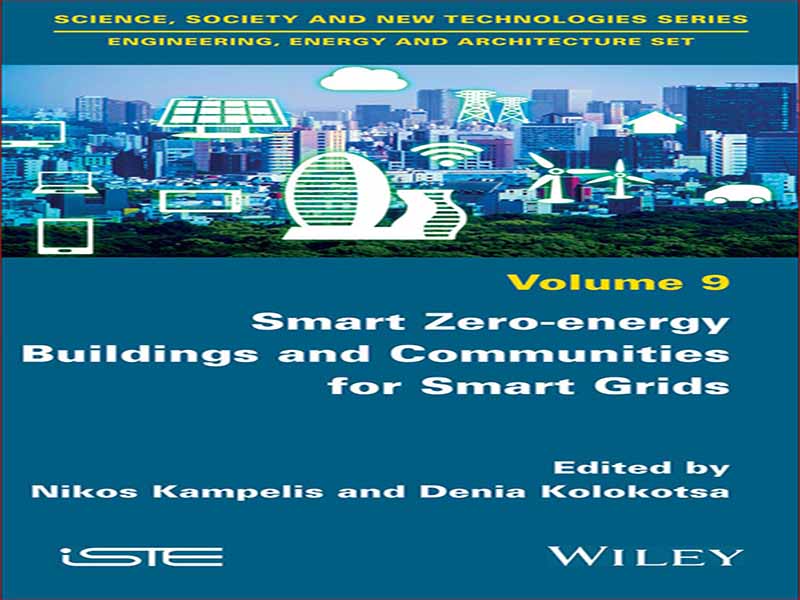- عنوان مجله: Smart Zero-energy Buildings and Communities for Smart Grids
- نویسنده: Lazaros E Mavromatidis
- حوزه: َانرژی هوشمند
- سال انتشار: 2022
- تعداد صفحه: 308
- زبان اصلی: انگلیسی
- نوع فایل: pdf
- حجم فایل: 41.5 مگابایت
ساختمانها و جوامع هوشمند و با انرژی صفر نقش عمدهای در تکامل بخش ساختمان و شبکه برق (یعنی شبکه هوشمند) به سمت انتقال ضروری در راستای سیاستهای کنونی بیطرفی کربن، کاهش تغییرات آب و هوا و سازگاری دارند. از این نظر، هدف کاهش انتشار گازهای گلخانهای در محیطهای ساخته شده را میتوان با رویکردی جامع دنبال کرد، در حالی که مصرف انرژی در ساختمانها به شدت کاهش مییابد. آخرین هنر در این زمینه، از یک طرف، به اجرای روشهای طراحی کارآمد انرژی و فناوریهای نوآورانه مربوط میشود که حداکثر پتانسیل صرفهجویی انرژی در ساختمانها را تضمین میکند. از سوی دیگر، پیشرفت فناوریهای ICT، همراه با ادغام انرژیهای تجدیدپذیر و ذخیرهسازی در سطح ساختمان و منطقه، با تولید، ذخیره، مدیریت و تبادل انرژی در سطح محلی، زمینه را برای ساختمانها و مناطق با انرژی خالص صفر یا مثبت فراهم میکند. مرحله. در این راستا، چالشهای مرتبط با نوسانات منابع انرژی تجدیدپذیر در سطح شبکه میتواند قابل کنترلتر شود. نقش ها و خدمات جدید و نوظهور که بخش ساختمان را با شبکه های هوشمند مرتبط می کند در آینده باید شفاف باشند و پایداری را ارتقا دهند. این امر مستلزم سیاستهای الهامبخش، منصفانه، مؤثر و نوآورانه است که نقشه راه این گذار و تحقیقات، نوآوری و آموزش بزرگ را ارائه میکند که (1) بازار را در ارائه راهحلهایی حمایت میکند که از استقرار انبوه فناوریهای سازگار با محیطزیست و کارآمد انرژی حمایت میکنند و (2) جامعه را در مورد اهمیت این گذار و نقشی که هر یک از ما باید ایفا کنیم، آموزش دهیم.
Smart and zero-energy buildings and communities have a major role to play in the evolution of the building sector and of the electric grid (i.e. the smart grid) toward the necessary transition in line with current carbon neutrality policies, climate change mitigation and adaptation. In this sense, the goal for the reduction of greenhouse emissions in the built environment can be pursued through a holistic approach whereas the consumption of energy in buildings is drastically reduced. State of the art in this field relates, on the one hand, to the implementation of energy efficient design methodologies and innovative technologies which guarantee the maximum energy saving potential in buildings. On the other hand, the advancement of ICT technologies, along with the integration of renewables and storage at building and at district level, provide the means for zero or positive net energy buildings and districts by producing, storing, managing and exchanging energy at the local level. In this direction, the challenges related with the volatility of renewable energy sources at grid level can become more manageable. New and emerging roles and services linking the building sector with smart grids in the future should be transparent and promote sustainability. This requires inspiring, fair, effective and innovative policies providing the roadmap for this transition and major research, innovation and training initiatives that will (1) support the market in providing solutions supporting mass scale deployment of environmentally friendly, energy efficient technologies and (2) educate the society about the importance of this transition and the role each and every one of us has to play.
این کتاب را میتوانید از لینک زیر بصورت رایگان دانلود کنید:
Download: Smart Zero-energy Buildings and Communities for Smart Grids



































نظرات کاربران